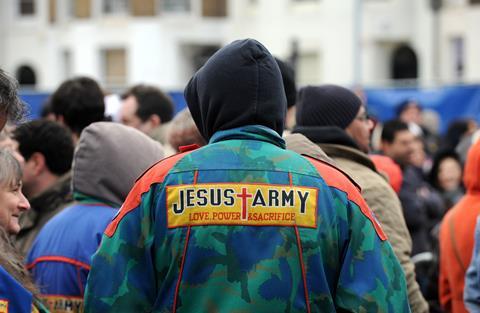The Jesus Fellowship Church started as a small Christian commune but became one of the most abusive cults in Britain. Since closing in 2019, it has paid out more than £7.7m in compensation to abuse survivors and twelve members have been convicted of sexual offences. John Everett shares his story of how he was recruited into the Jesus Army, and what happened when he left

Conventional choir-boy church attendance was a central feature of my childhood. Following a turbulent adolescence, however, I discovered a genuine, born-again faith in Christ at a charismatic church in Luton. When I went to university, I joined the Christian Union (CU), which further nurtured my faith.
In the summer term of 1977, I accepted the invitation of a CU friend to spend a weekend at Bugbrooke in Northamptonshire, the village where the Jesus Fellowship Church (JFC) had established a residential community of shared possessions and income.
First impressions
Contentment, joy and love appeared to radiate from the beautiful perma-smiles of every ‘brother’ and ‘sister’ I met at New Creation Hall, a former vicarage that had become home to some 40 community members of various ages and backgrounds. I experienced it as a utopian idyll in the midst of a frenetic world.
The JFC’s founder, firebrand preacher Noel Stanton, delivered a thunderous oration at the evening meeting held in the village Baptist chapel – a small, sandstone building that was overflowing with several hundred garrulous, charismatic worshippers.
Stanton instructed my friends to shun me. This led to a devastating mental breakdown
Many of the young men were dressed in the same casual attire of denim that I too favoured; the women, without exception, were clothed in loose-fitting dresses, or skirts and blouses, and had long flowing hair. Despite Stanton’s shouting and stentorian tone, his preaching resonated with my all-or-nothing aspirations for a radical Christian lifestyle, and I sensed the powerful presence of the Holy Spirit.
I was invited to join the Fellowship’s 1977 summer retreat at Ashburnham Place in East Sussex. It was here, surrounded by Capability Brown’s magnificent landscapes, that I experienced a profound assurance of what I then believed to be God’s intent for me to “join up”. Having moved into the New Creation Farm household later that same summer, I remained within the Fellowship until 1982.
Early warning signs
Certain aspects of the JFC had troubled me from day one, including the dismissive attitude towards other ‘inferior’ churches and non-believing outsiders – or ‘worldlings’ as they were unkindly labelled. I foolishly but unsuccessfully tried to sweep such misgivings beneath thick layers of mental carpet.
Other suppressed reservations included Stanton’s unchallenged authoritarian control; the repressive treatment of women; the corporal punishment (‘rodding’) of children; and the profit-laden operational ethos of the ever-growing community-owned businesses: “robbing the kingdom of the world to build the kingdom of God”.
In 1979 Stanton asked me to enroll as a postgraduate student at Warwick University and produce a sociological PhD thesis that he hoped would exonerate our communal lifestyle. The research, however, increasingly forced my reservations to the fore. I concluded that all the classic features of a cult were embedded in our organisational DNA.
I was especially troubled by Stanton’s insistence that we should rid ourselves of any criticism whatsoever towards the Jesus Fellowship: I was unable to comply. When my birth sister, Jane, experienced severe financial hardship and I was forbidden from giving her a very small gift of money, I realised that I’d become a moral robot, unable to follow the voice of my own conscience.
Hidden dangers
Those who left the JFC were branded as traitors to both the Fellowship and to God. It was a very real, incarcerating constraint. Yet in 1982, my anger at Stanton’s authoritarian domination and my shame at who I’d become as a person bubbled over. I found the necessary conviction and courage to break away.
Stanton instructed all my erstwhile friends to shun me as a heathen; as someone under God’s judgement. I was formally excommunicated. This led, ultimately, to a devastating mental breakdown, for which I needed extensive hospital treatment.
I experienced it as a utopian idyll in the midst of a frenetic world
Over the four decades since then, I have got married, had three children and watched them establish their own families and gift us with seven grandchildren. Alongside the hurly burly of family life, I have done everything possible to warn about the hidden dangers of the JFC, who became widely known in the new millennium as the Jesus Army (JA).
When my motivation to do so has flagged, I’ve found the strength to carry on through remembering the spiritual and emotional pain - and all manner of abuse – that I know many have experienced through their involvement with the JA.
The Fellowship’s formal closure in 2019 gave me no cause for celebration or joy, just an overwhelming feeling of sadness concerning all that had happened.
My own inner faith is no longer a conventional evangelical one, yet I remain inspired and sustained by the teachings of Christ. I hold my spirituality close and am eternally grateful for the contentment and self-awareness I enjoy. All around me, I see wonderful demonstrations of sacrificial love and a desire to place the welfare of others before ambition or material gain. Such affirmations of transcendent goodness can be part of everyday life and need not be restricted to the confines of a communal lifestyle – and nor are they.
Although Jesus occasionally showed extreme anger, towards hypocrisy in particular, he was never coercive, abusive or bullying. If you have reason to suppose that the leader of your own organisation – church-based or otherwise – is exercising coercive authoritarian control, you may be sure that it isn’t good or right; all the more so if you are made to feel inadequate and belittled. Please seek help from those higher up the hierarchical chain if there are any. If not, contacting an organisation such as the Family Survival Trust might be a good place to start.
Throughout Church history, many have believed the sharing of possessions - as described in Acts 2:44-45 - to be an authentic blueprint for church life. And many of us yearn, or have yearned, for a simpler, less-materialistic lifestyle. Accountability, however, is possibly the essential feature to ensure communal safeguards are in place. Going it alone, left unchecked, can become a cancer that consumes and destroys. In 2018, the Evangelical Alliance wrote to the JFC urging them to accept oversight from, and accountability to, a recognised denominational leadership. By then, however, it was too late, and the JFC leadership instead chose closure. Theirin lies a lesson that should not be forgotten.
John Everett is a contributor to the new BBC documentary Inside the Cult of the Jesus Army, available now on iPlayer



































1 Reader's comment